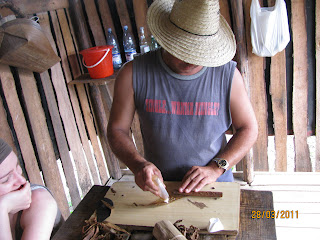 |
| Vinales - rust red tobacco fields shadowed by mountains |
That said, friendly hosts have helped organise great activities such as private salsa lessons (where the teacher comes to the house) and a horse riding trip to a tobacco farm. Adam and I hadn’t yet tried salsa, nor had we tried any form of coupled dancing, so a private lesson was a great way to minimise embarrassment. The actual step is easy, but to do it properly is pretty involved. After nearly an hour and a half we had only mastered the three most basic moves.
Horse riding was fun, but a downside is that you can’t check out the condition of the horses and how they’re being treated in advance. Our casa owner in the picturesque town of Vinales, west of Havana, organised for a friend to take us over to his stables. When they walked out the first horse, I automatically assumed from the size of it that it was meant for me, but it was actually their biggest horse for Adam to ride. Its hip bones jut out quite a bit and it had caked mud behind its ears and down its neck.
 |
| Everyone has time to stop for a chat |
We plodded past rust-red tobacco fields and vegetable plantations on dirt tracks that wound their way in and out of farms. The landscape was dotted with A-frame palm-thatched huts where tobacco leaves are dried for three months of the year. Huge emerald-green limestone mounds provided a stunning backdrop.
There are few cars in Vinales, besides a handful of puttering 50s model buicks and oldsmobiles. The main forms of transport here are horse and cart or fixed-speed bicycle. Our trail led us into a tobacco farm where a guy with a hilarious Tshirt that said “Single…wanna mingle?” made us mojitos made with orange and honey and showed us how to roll a cigar from freshly dried tobacco leaves.
 |
| Sealing cigars with honey |
The tobacco is bunched together and firmly rolled to prevent air pockets from forming. To seal the cigar, it is rolled in a single custom-shaped leaf and affixed with honey. The fresh-rolled cigars we were given were really strong, because apparently they contained a large percentage of the top - or crown - of the plant.
We were lucky enough to arrive in sleepy Vinales during its biggest annual event. Each town in Cuba has a week-long state-sanctioned party, or carnival, once a year. Not that Cubans are prevented from partying at other times, but on these occasions the entire main street of town is closed off and a variety of performers are on show on several different stages.
 |
| Fruit store |
The carnival is like a Big Day Out-style festival only it’s free and the music is way better – from Cuban son to salsa, reggaeton and techno. The main street is lined with vendors selling cheap trinkets, lollies and snacks. There were even whole suckling pigs whose meat was pulled out and stuffed into baguettes.
No comments:
Post a Comment